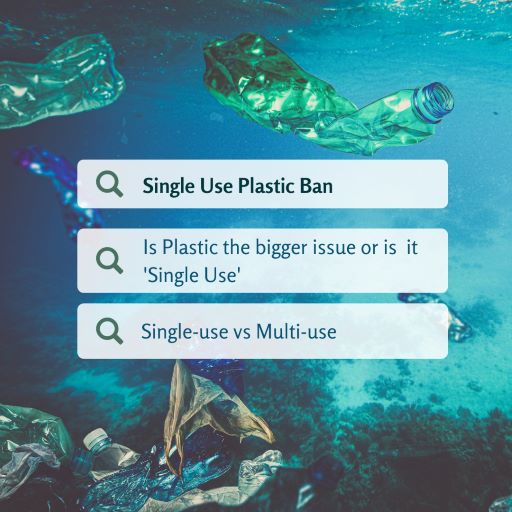
SUP stands for Single Use Plastic. It is a plastic item intended to be used once for the same purpose before being disposed of or recycled. SUPs have been banned in India starting July 1, 2022. Some of the highlights of this ban include:
- Not all SUP items are banned, a small list, identified on the basis of their low utility and high littering potential, includes
- plastic plates, cups, glasses, 8forks, spoons, knives, straws, stirrers, and, trays among others.
- polystyrene or thermocol for decoration,
- wrapping/ packing films around sweet boxes, invitation cards, cigarette packets,
- plastic or PVC banners less than 100 microns,
- plastic sticks (for earbuds, balloons, ice creams and candies, flags)
- While many states and cities have been introducing the SUP ban, this is the first pan-India ban on SUP. Earlier, in September 2021, only plastic carry bags less than 75 microns were banned pan-India
- Unlike haphazard bans earlier, the 2022 SUP ban was announced a year in advance, giving enough time to the impacted parties
- Unlike earlier bans, the 2022 ban also covers manufacture, import, stocking, and distribution, and is not restricted to a ban on the sale and use of SUPs
- Those flouting the ban can be jailed up for to five years or/and fined up to Rs 1 Lakh.
Will the 2022 SUP Ban solve the problem of plastic pollution? Not yet. Here is why:
- The plastic packaging of processed food and food delivery packaging contribute to 60% of the plastic waste generated. Unfortunately, these two streams of plastic waste are not covered currently under the SUP ban
- Ban implementation has always been a challenge. For example, the 75 micron limit on plastic carry bags which was introduced under the September 2021 ban, has not been effective to date. Under the 2022 SUP Ban, the Government plans to set up:
- National and State control rooms
- Border checkpoints to stop inter-state movement;
However, without adding additional enforcement force, this cannot be done as all regulatory agencies such as the Pollution Control Board, Municipalities, Police, etc. are understaffed. Unless dedicated additional staff is assigned for the enforcement of this ban, supported with appropriate regulatory powers, this ban will also not be effective.
What is this problem really about though? Plastics or the concept of ‘Single-Use’ itself?
The primary concern over the ban is that single-use plastic items will be replaced by other single-use items, such as paper items with or without a plastic lining. A study by the University of Cambridge and Technische Universitat Berlin ( https://d-nb.info/1222099179/34) has shown that single-use paper items have a much bigger environmental footprint compared to single-use plastic items. Therefore, the government must emphasize that the aim of this ban is not only curb the use of plastics, but also to reduce the consumption of single-use items altogether, no matter which material they are made of.
What then is the solution? How can we move from single-use to multi-use?
It is time the Indian government & society adopt a service-based economy where goods and services are available to consumers on rent. The most common example of the servitisation model is cab services offered by companies like Ola & Uber, which have the potential to bring down the number of privately-owned vehicles on Indian roads in the long run. This would not only bring down pollution but also reduce the overall use of resources required to manufacture these vehicles.
Through a shared economy, the same product serves multiple users and/or serves for longer through reuse, repair, refurbishment, and remanufacturing. Servitisation, therefore, leads to both reductions in resource consumption & waste generation. Multiple service layers get added onto a product thus increasing the per product revenue while overall material consumption is reduced. This also leads to local job creation at the point of consumption instead of being concentrated at the point of manufacturing.
While servitization is happening on a small scale in India and other countries, such as through cutlery banks, and refillable services for FMCG products, there is a need to provide subsidies to allow such service models to scale up. With our large population density, these models will be very successful, and the cost of ‘usage’ will be low so that even the poorest can use them. Most importantly, this will generate far more jobs than the single-use industry.
Bans alone, therefore, are not the silver bullets to waste reduction. Rather, they must be coupled with servitization of products to avoid the single-usage of any product to truly bring down waste & have a significant impact on the environment.
